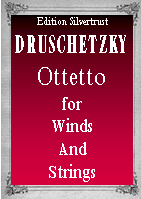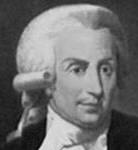Presents
Georg Druschetzky
 |
 |
Ottetto for Oboe, Clarinet, Horn, Bassoon, Violin, Viola, Cello & Bass
Georg Druschetzky (1745-1819 Jiří Družecký in the Czech form) was born in the small Bohemian town of Jemniki, then in the Austrian Habsburg Empire. Though his primary instrument was the oboe, he also became a first rate timpanist. The latter offered him a career in the military and he served as a grenadier, rising to the rank of Regional Director of Percussion for the Austrian army. After leaving the army, he served as composer to several Hungarian and Austrian noblemen, and was eventually appointed court composer to the Archduke Joseph, then Regent of Hungary. Druschetzky spent the last decades of his life in Budapest. Though, as might be expected, he wrote a great deal of works for the oboe and other wind instruments and much military band music which included the timpany, he was a versatile and prolific composer, who wrote in virtually every genre. Among his output were many chamber music works, including 12 string quartets and 4 string quintets and several other works for various combinations of winds and strings.
Druschetzky usually signed himself Giorgio Druschetzki and many of his works including his Ottetto, bear Italian rather than German titles. Manuscripts, some by copyists, exist in Prague, Vienna and Budapest and perhaps elsewhere. The Ottetto also bears the title Serenata on at least one manuscript. It was composed sometime between 1808 and 1812, at which time Druschetzky published an arrangement for wind nonet of Beethoven's famous Op.20 Septet. This was not a one off, Druschetzky was intimately familiar with the works of his contemporaries, in particular Mozart, Haydn and Beethoven, and made dozens of arrangements of their various compositions. That he knew Beethoven's Septet is important to note because his Ottetto bears many similarities to that work. First, the key, E flat Major, is the same as is the number of movements. The instrumentation is the same, except that Druschetzky added an Oboe, his own instrument, and the treatment of the voices is similar as well. This said, the thematic material is very different and the work does not imitate Beethoven's in this respect.
This is a welcome addition to the repertoire and our modern edition based on earlier editions in Budapest and Vienna adds rehearsal numbers and corrects a few mistakes.
Parts: $49.95
Parts & Score: $59.95